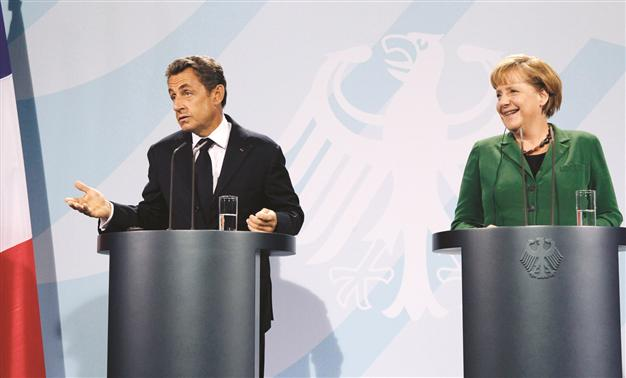Germany, France promise new plan to tackle eurozone crisis
BERLIN - Reuters

French President Sarkozy (L) and German Chancellor Merkel address a press conference at the Chancellery in Berlin on Oct. 9. Germany and France have to deliver a response to stabilize the euro, Sarkozy says. Reuters photo
The leaders of Germany and France have promised to unveil new measures to solve the eurozone’s debt crisis by the end of the month.German Chancellor Angela Merkel and French President Nicolas Sarkozy said after talks in Berlin on Sunday evening that their goal was to come up with a sustainable answer for Greece’s woes, agree how to recapitalize European banks and present a plan for accelerating economic coordination in the eurozone by the Group of 20 summit in Cannes on Nov. 3-4.
But they declined to reveal any details of their plan. As they met, British Prime Minister David Cameron urged them to take a “big bazooka” approach to the crisis, telling the Financial Times that eurozone leaders had to break their cycle of doing “a bit too little, a bit too late.”
“We are very conscious that France and Germany have a particular responsibility for stabilizing the euro,” Sarkozy said, standing next to Merkel at a press conference. “We need to deliver a response that is sustainable and comprehensive. We have decided to provide this response by the end of the month because Europe must solve its problems by the G20 summit in Cannes.”
Financial markets were hoping the meeting would produce a breakthrough. “It’s great to see Sarkozy and Merkel talking, but they have to come up with some firm conclusions on what needs to be done,” said Chris Wheeler, an analyst at Mediobanca in London. “The end of the month is a long way away. There has to be some clarity on what we need and it’s not coming through.”
Sarkozy said he and Merkel were in “total agreement” on the recapitalization of European banks, even though officials in Paris and Berlin have made clear in recent days that the countries are far apart.
Foreign leaders are looking on in horror at the squabbling, fearful the eurozone crisis could plunge their own economies back into recession.
Pressure from Britain
Britain’s Cameron, in an interview with the Financial Times, pressed eurozone leaders to increase the firepower of their 440-billion-euro rescue fund - the European Financial Stability Facility (EFSF) - and to remove all uncertainty about Greece’s economic future.
A senior banker told Reuters in Paris that French politicians were worried that even an orderly Greek debt default could floor French banks and were pushing for action to bolster capital levels.
Paris wants to tap the EFSF to shore up its banks, worried that pouring its own money into them could compromise its coveted triple-A credit rating.
Officials in Berlin have made clear that they believe the fund should be used only as a last resort, when eurozone member states don’t have the means to support their banks on their own.
Another area of contention is how to use a new, enhanced EFSF to buy sovereign debt - an issue that would become particularly crucial if Greece failed to secure a new aid tranche.
In addition to addressing the banks and Greece, Merkel said France and Germany were working on steps to boost economic coordination and said their proposals would necessitate changes to the bloc’s Lisbon Treaty.
Sarkozy made clear, however, that Europe needed to “take decisions now”, rather than announce long-term plans that would take time to implement. Changing the treaty could take several years.
“Comprehensive, sustainable and rapid responses before the end of the month. That is the result of this Franco-German meeting,” he said.
German news agency DPA, citing financial sources, reported on Sunday that eurozone finance ministers were working on scenarios involving a 60 percent reduction in Greece’s debt.
















